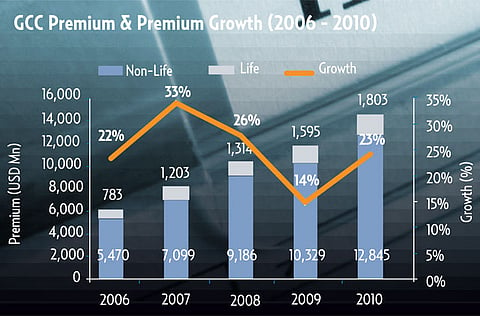Gulf insurance sector to grow 20%
Saudi, UAE will contribute most to annual growth in new premiums

Dubai: With the general consensus suggesting anaemic single-digit growth in premium income so far this year, to aim for a four-fold increase and more over the next four years might seem like taking on Mount Everest without oxygen support.
But it is a 20 per cent CAGR (compounded annual growth rate) in premium income that is being projected for the GCC's insurance sector in the next four years by a new report, with the UAE and Saudi Arabia generating the bulk of the new business.
This would see gross premiums totalling $18 billion (Dh66.1 billion) this year and rise up to $37 billion in four years, according to report by Alpen Capital.
As per the forecasts, the UAE and Saudi Arabia would combine to take up 75 per cent of the premiums generated by 2015, while Qatar is expected to register the fastest growth — a CAGR of 30 per cent — over the next four years.
Tough task
Is it doable? The state of the global economy implies that the next 12 months could be particularly severe for trade and that would have its impact on trade-related premiums generated in the GCC.
The construction sector, while not in retreat, is yet to start seeing a steady stream of projects being placed on the market. (Saudi Arabia and, shortly, Qatar may be the general exceptions to the subdued projections for new project activity.)
Against such a bleak backdrop, where exactly can the GCC's insurers seek growth? Ghassan Marrouche, general manager of Takaful Emarat, outlined how an upbeat scenario can actually pan out.
"The insurance industry usually shows a varied result in the two halves of the year; the first is steady and composed while the second is rather aggressive and high paced," he said.
"Therefore, it's natural that the market sentiment expressed by Alpen Capital will be more positive compared to the first-half of the year.
"As for our forecast for the next three years, we feel both the government as well as the private sector will play an active role in bringing more regulations and procedures to the industry. This would result in benefiting the customers through a variety of products — a few of them will be in mandatory form such as health insurance — and high quality service.
"We are very confident these initiatives will bring about positive changes [and] hence one can expect a good percentage growth in premium volumes."
For the record, the Alpen Capital report reckons that the non-life segment in the GCC can put in a 19 per cent growth in premium income generation, while life should be putting in a much robust 25 per cent CAGR helped by a growing population base and higher per capita income. Further, life insurance density will more than double to $113.5 billion from the $50.8 billion expected by the end of this year.
Outside impact
But the fault-lines created by economic upheavals in the US and the EU will have a qualitative impact on the ability of GCC insurers to place their risks with global reinsurers. Already, some gaps are being sighted.
"Capacity is being offered as in the past for direct insurance; however reinsurers are imposing severe restrictions on co-insurance and facultative reinsurance," said a senior manager with a Dubai-based insurer.
"Also, many reinsurers are not allowing any form of facultative reinsurance from Oman. The global recession, meanwhile, has contributed to reduced exports and imports of commodities, including vehicles, which have resulted in reduced marine premiums."
Marrouche added: "There had been losses recorded by a few of the big industry players resulting in overburdening reinsurers with non-reserved financial liabilities. As a result, reinsurers are now very cautious in taking a risk in the region.
"Hence the capacity offered is either low or comes at a high price for insurers."
But despite the impression of unremitting gloom, there are some silver linings being created at the same time. Where global reinsurers take on a more cautious approach vis-à-vis Middle East related risks, regional reinsurers are trying to fill the void.
"It is a fact that more and more regional reinsurers — Saudi Re, Trust Re, Arig, Al Fajer Re, etc. — have started offering treaty support to local insurance companies," said a Dubai-based insurer.
The Alpen Capital report had this to say about the reinsurance situation: "Qatar has identified the opportunity and taken the lead to establish a regional hub for reinsurance at the Qatar Financial Centre. The country's liberal policies, such as special tax concessions for reinsurers and 100 per cent foreign ownership, offer distinct advantages.
"Taking cue, a number of global reinsurance companies are expected to establish a presence in Qatar."
Other global players also see the present as offering them more opportunities than at any time in the past.
Negotiable prices
"A few reinsurers are entering with negotiable prices and high capacity to offer," said Marrouche. "It's now up to the insurance companies to review their reinsurance arrangements with new players according to the risk profile they carry."
Staying with the positives, there is Takaful — Islamic insurance — factor. "Greater availability of Takaful and Islamic finance products is expected to provide a strong impetus for growth to the insurance industry," said Alpen Capital. "Takaful premiums have grown at a rapid CAGR of 45 per cent during the 2004-09 period."



